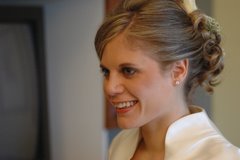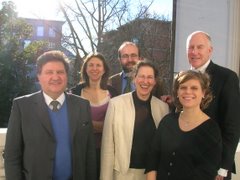I came across this article recently published by The Economist: http://www.economist.com/node/21527025 which is on game theory. It explains how game theory may be used (and how it is used) to predict human beings' behaviour in a variety of fields. Politics and negotiation are just a couple of good examples. The journalist even reports that game theory would have played a role in finding Bin Laden's hiding place last May.
Well, so far so good. The fact is, I knew about game theory because when I was working on my PhD on dispute mediation I learnt that this branch of mathematics is used in negotiation. I did not really use it for my own research; my feeling was that the emphasis on a mathematical model was hardly conciliable with my own focus on argumentation - and how argumentation can indeed change the power balance, change the individuals' priorities by helping them find out their real interests. So I sort of abandoned game theory halfway through my PhD journey.
However, who knows... In The Economist's paper, I found it particularly interesting that a game-theory based consultation may cost you a lot of money because you "must first conduct lengthy interviews with experts" to construct a reliable model. Perhaps investigating this aspect - what these "lengthy interviews" amount to and how they are used - would allow integrating game theory in an argumentation-focused study of argumentation and mediation.
Showing posts with label News. Show all posts
Showing posts with label News. Show all posts
Monday, 12 September 2011
Monday, 20 September 2010
An Essay in aid of a Grammar of Assent
The State visit of the Pope to England has been the subject of a vivid debate on the media recently. Yet this is not the only reason why it is relevant from the argumentative point of view. On Sunday, the
beatification of cardinal John Henry Newman was celebrated. For me, this was the occasion to have a look to some of the writings of this man and cardinal, in particular to "An Essay in aid of a Grammar of Assent", which, in many respects, is relevant to argumentative studies.
I will just quote a passage here:
There is another reason for attempting to discover an instrument of reasoning (that is, of gaining new truths by means of old), which may be less vague and arbitrary than the talent and experience of the few or the common-sense of the many. As memory is not always accurate, and has on that account led to the adoption of writing, as being a memoria technica, unaffected by the failure of mental impressions,—as our senses at times deceive us, and have to be corrected by each other; so is it also with our reasoning faculty. The conclusions of one man are not the conclusions of another; those of the same man do not always agree together; those of ever so many who agree together may differ from the facts themselves, which those conclusions are intended to ascertain. In consequence it becomes a necessity, if it be possible, to analyze the process of reasoning, and to invent a method which may act as a common measure between mind and mind, as a means of joint investigation, and as a recognized intellectual standard,—a standard such as to secure us against hopeless mistakes, and to emancipate us from the capricious ipse dixit of authority.
From:
An Essay in aid of a Grammar of Assent, Chapter 8 section 1 (See the full text)
beatification of cardinal John Henry Newman was celebrated. For me, this was the occasion to have a look to some of the writings of this man and cardinal, in particular to "An Essay in aid of a Grammar of Assent", which, in many respects, is relevant to argumentative studies.
I will just quote a passage here:
There is another reason for attempting to discover an instrument of reasoning (that is, of gaining new truths by means of old), which may be less vague and arbitrary than the talent and experience of the few or the common-sense of the many. As memory is not always accurate, and has on that account led to the adoption of writing, as being a memoria technica, unaffected by the failure of mental impressions,—as our senses at times deceive us, and have to be corrected by each other; so is it also with our reasoning faculty. The conclusions of one man are not the conclusions of another; those of the same man do not always agree together; those of ever so many who agree together may differ from the facts themselves, which those conclusions are intended to ascertain. In consequence it becomes a necessity, if it be possible, to analyze the process of reasoning, and to invent a method which may act as a common measure between mind and mind, as a means of joint investigation, and as a recognized intellectual standard,—a standard such as to secure us against hopeless mistakes, and to emancipate us from the capricious ipse dixit of authority.
From:
An Essay in aid of a Grammar of Assent, Chapter 8 section 1 (See the full text)
Sunday, 13 December 2009
Women in research _ Press Release by the FSO
Science and Technology in Switzerland
In Switzerland and in Europe scientific research remains essentially male
Neuchâtel, 07.12.2009 (FSO) – Although science is no longer a male prerogative, an analysis by the Federal Statistical Office (FSO) of the European Commission's publication "She Figures 2009" shows that in Switzerland, as elsewhere in Europe, gender equality has not yet been accomplished in this domain. While the numbers show that women's participation in scientific research has generally been growing at a faster rate than men's over the past decade, this trend has not yet led to gender equality, either in Switzerland or in the rest of Europe.
Published every three years, since 2003 "She Figures" has presented indicators on women's participation in scientific research in Europe. It is used by the European Union as a point of reference to evaluate progress towards gender equality in this field. The figures presented here refer mainly to data from 2006 and 2007.
Press release, December 7, 2009
www.bfs.admin.ch
In Switzerland and in Europe scientific research remains essentially male
Neuchâtel, 07.12.2009 (FSO) – Although science is no longer a male prerogative, an analysis by the Federal Statistical Office (FSO) of the European Commission's publication "She Figures 2009" shows that in Switzerland, as elsewhere in Europe, gender equality has not yet been accomplished in this domain. While the numbers show that women's participation in scientific research has generally been growing at a faster rate than men's over the past decade, this trend has not yet led to gender equality, either in Switzerland or in the rest of Europe.
Published every three years, since 2003 "She Figures" has presented indicators on women's participation in scientific research in Europe. It is used by the European Union as a point of reference to evaluate progress towards gender equality in this field. The figures presented here refer mainly to data from 2006 and 2007.
Press release, December 7, 2009
www.bfs.admin.ch
Subscribe to:
Posts (Atom)


